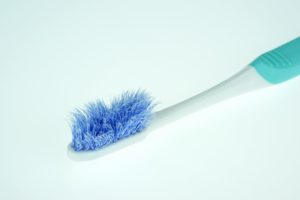
Do you brush your teeth often or with vigorous force because you believe it will remove more plaque and harmful oral bacteria from your mouth? Although this logic makes sense, brushing too hard and frequently can put the health of your gums and teeth in jeopardy. If your teeth have a V-shape to them, hard bristles or a faulty brushing technique are most likely the cause. Read on to learn about the dangers of toothbrush abrasion and why you want to avoid overbrushing.
What Problems Can Frequent and Forceful Brushing Cause?
Countless clinical studies have shown that brushing too frequently or aggressively with a hard-bristled brush can cause permanent damage to the protective layer of your tooth called the enamel. Once this shield has eroded, more sensitive layers of your tooth like the dentin will become exposed to harmful oral bacteria and hot and cold temperatures. Another factor that can lead to this is frequently using abrasive oral hygiene products like whitening toothpastes.
No matter what’s causing your teeth to become worn down, it can result in serious and even permanent consequences that have grave impacts on your oral health. Abrasion wounds can cause gum recession, which is when your gums gradually pull away from your teeth and expose the roots, making them appear longer. This makes them more susceptible to infection and decay.
How Can I Tell If I’m Damaging My Mouth?
Vigorous brushing isn’t necessary because plaque is so soft. When you brush, a gentle circular motion only using the pressure provided by your thumb and first two fingers naturally resting on your brush will remove plaque. If you’re using too much pressure, you may notice that your toothbrush bristles become easily frayed or bent. You may also notice that your gums bleed every time you brush. Try to ease up on the pressure you’re using. If that doesn’t solve the problem of bleeding gums, visit your dentist.
How Can I Prevent Toothbrush Abrasion?
To avoid the dangerous impacts of toothbrush abrasion, pay attention to how much pressure you’re applying to your toothbrush when you brush your teeth. Use small, gentle, circular motions instead of vigorously moving back and forth. If you’re not confident that you can use the proper technique, try purchasing a rotating or oscillating electric toothbrush. Some of them even have pressure sensors on them that stop oscillation if the improper amount of force is being used.
You can also speak with your dentist during your routine checkup and cleaning to see how your brushing technique seems to be affecting the health of your teeth and gums. They can alert you to any signs of dental abrasion they see and give you additional recommendations on how to combat the issue. With the proper technique and care, you can avoid the discomfort associated with brushing too frequently or aggressively.
About the Author
Dr. Sean Bannon started his career in the dental field as an assistant, earning his Doctor of Dental Surgery years later. He is an active member of several professional organizations, allowing him to stay up to date with the latest advancements in his field so he can implement them at his practice. He values each of his patients and looks forward to spending time getting to know them. For questions or to schedule an appointment, visit Water’s Edge Dental’s website or call 386-461-5883.
